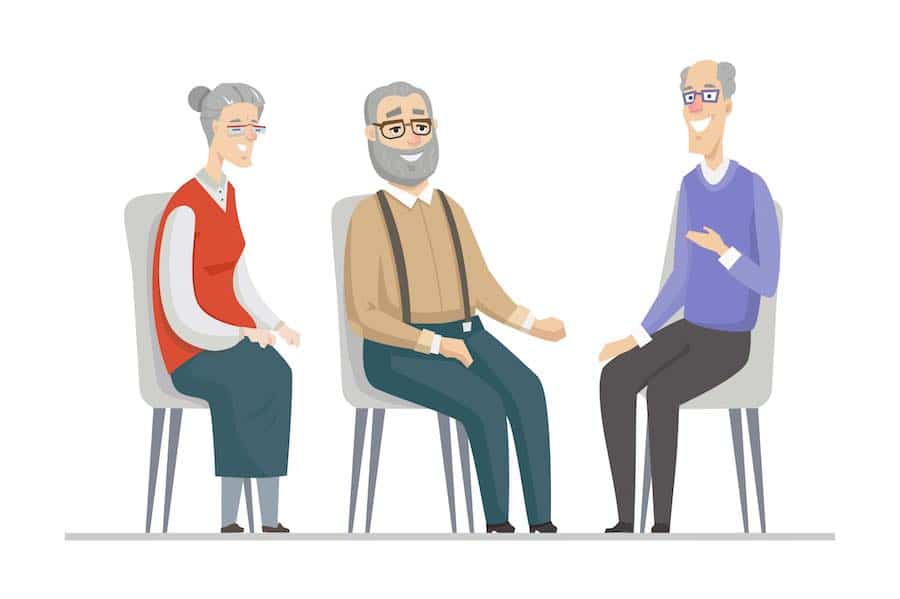Preparing end-of-life documents for a loved one may seem like a daunting task, but it doesn’t have to be. By planning ahead and using simple templates, families and their loved ones can begin hospice care with confidence. But what are end-of-life documents, and why are they important?
As patients progress through out-of-hospital care and their health naturally declines, it becomes harder and harder for them to make rational decisions on their own. It can be relieving to know that a loved one’s wishes have been documented before this decline begins. The best way to ensure this happens is by using simple templates explaining your loved one’s wishes, and to do it as soon as possible. The paperwork that we encourage families to prepare are:
- Do not resuscitate
- Power of attorney
- Funeral arrangements
When your loved one receives services through Envision Hospice, your care team will ensure that you have access to these documents and understand what each one is for. Let’s look into what makes these end-of-life documents important.
Do Not Resuscitate
It can be hard to talk about this document. We understand. A do not resuscitate (DNR) form indicates that the patient does not want resuscitation efforts to be made in a life-ending event. It is challenging to face the end of a loved one’s life, and it can be even harder to talk about what to do in the event of a loss. However, it is important to talk to your loved one about their wishes while they are able to make these decisions for themselves. By discussing the options they have, your loved one can begin to process and solidify exactly what they want to happen. Without having this prepared ahead of time, a spouse or adult child may struggle to make this decision on their loved one’s behalf.
Preparing a DNR ahead of time can prevent family members from having to guess what the patient would want, or having to make significant decisions alone.
When preparing the DNR form, you’ll need to designate who is signing and what their relationship is to the patient. Ideally, the patient will be present and of sound mind during the signing. If the patient is unable to participate, a designated power of attorney (which we will address next) or family member may prepare the document on their behalf. In order to prepare end-of-life documents on the patient’s behalf, one must be a qualified relative. A qualified relative may be any of the following:
- Spouse
- Adult child
- Parent or legal guardian
- Designated power of attorney
- Nearest living relative
Should the patient choose to fill out a DNR form themselves, they may be assisted by a relative, power of attorney, or a member of their care team. If your loved one decides against preparing this form and would like to be resuscitated, it’s best to document this ahead of time as well. Whatever decision your loved one makes, Envision Hospice is here to assist your family in the process. DNR documents can be hard to talk about, but they can bring about important conversations that can help the family process this difficult time.

The document itself is straightforward and can be found here. Similarly, an advanced directive form can empower your loved one to make important medical decisions for their future while they are of sound mind. It’s worth filling out both of these as soon as possible to ensure your loved one makes these decisions themselves. The social worker on your team is prepared to help your family through both of these end-of-life documents, and warmly address any concerns you may have. Before preparing the DNR form, it can be helpful to have a designated power of attorney.
Power Of Attorney
While a hospice patient is of sound mind, they may opt to designate someone to make decisions and sign paperwork on their behalf. We encourage patients to do this so that they have time to process their wishes for end-of-life care, and feel confident that these wishes will be carried out. This designated person is referred to as a power of attorney.
When your loved one is confident that their wishes will be carried out, they may feel a sense of relief and contentment. It feels good to know that no matter what happens, one’s medical and financial plans will be in place. A power of attorney is given the authority to make medical and financial decisions while the patient is in hospice care and after they have passed away.
For example, a patient developing Alziemer’s may designate their spouse as their power of attorney early in their out-of-hospital care. Now, their spouse has the authority to prepare end-of-life documents, funeral arrangements, financial dealings, and carry out any other plans their loved one had made. Because the patient’s spouse is a trusted loved one familiar with their wishes and plans, the patient can feel at peace with their decisions. The weight is also taken off of the spouse to make these decisions on their own because they have spoken to their loved one ahead of time about their plans.
End-of-life care is a delicate time. It is a time that should be spent enjoying the moments you have with your loved one, creating cherished memories. Without a power of attorney being designated, there may be unnecessary stress within the family during this time. Your loved one would be unable to designate a power of attorney if they are no longer of sound mind. It is important to prepare this document ahead of time so that your family’s experience is not troubled by figuring out who is in charge of what and how your loved one’s wishes will be carried out.

A power of attorney template can be found here in English and Spanish, and our team is here to help your family prepare it.
Funeral Arrangements
Some families choose to prepare funeral arrangements along with other end-of-life documents. While it is not required, preparing arrangements before the passing of the loved one can relieve the family of decision making and planning during the grieving process. It can make it easier on the whole family to make some of these plans ahead of time, and to include your loved one in the process if they choose. Coping with grief while planning a funeral can feel overwhelming to many.
We encourage families to begin looking into the funeral-planning process as soon as they feel comfortable doing so. Of course, your Envision Hospice team is here to provide you with the resources and support you need to begin.
Remember, end-of-life documents do not have to be complicated. By preparing these simple forms ahead of time, it can save your loved one and family from unnecessary stress and decision-making. Most importantly, these documents ensure that your loved one’s plans are carried out the way that they want them. If you would like assistance with any of these documents or just need to talk, please contact us any time.

